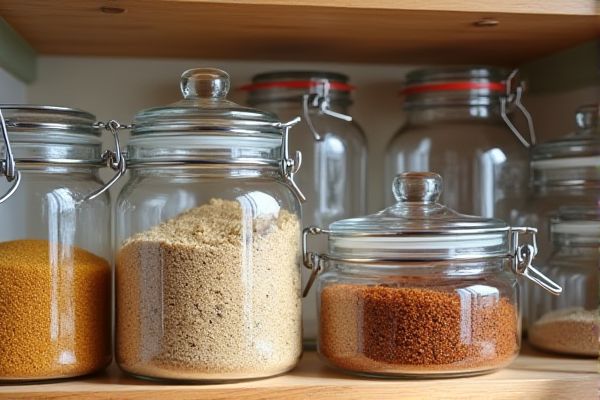
Glass pantry jars offer superior durability, non-toxicity, and better preservation of food flavors compared to plastic jars, which may absorb odors and degrade over time. Explore the rest of this article to discover which option will best suit your kitchen storage needs and enhance your pantry organization.
Table of Comparison
| Feature | Glass Pantry Jars | Plastic Pantry Jars |
|---|---|---|
| Material | Tempered or borosilicate glass | Food-grade BPA-free plastic |
| Durability | Fragile, prone to breaking | Impact-resistant, shatterproof |
| Transparency | Crystal clear, high visibility | Clear or semi-transparent |
| Odor & Stain Resistance | Non-porous, resists odors and stains | Can retain odors, prone to staining |
| Weight | Heavy | Lightweight |
| Seal Quality | Airtight with silicone or rubber gaskets | Airtight, but less effective over time |
| Environmental Impact | Reusable, recyclable, eco-friendly | Less eco-friendly, can degrade over time |
| Cost | Higher initial cost | Lower initial cost |
| Suitability for Food Storage | Ideal for dry goods, preserves freshness | Good for dry goods but may absorb odors |
Introduction to Glass and Plastic Pantry Jars
Glass pantry jars offer superior durability, non-porous surfaces, and better resistance to staining and odors compared to plastic jars. Plastic pantry jars provide lightweight, shatter-resistant options ideal for easy handling and transport. Your choice between glass and plastic pantry jars impacts long-term food preservation and environmental sustainability.
Material Composition and Safety
Glass pantry jars are made from natural silica sand and are non-porous, ensuring they do not leach harmful chemicals into your food, making them a safer option for long-term storage. Plastic jars, often composed of polyethylene or polypropylene, may contain additives like BPA or phthalates, which can pose health risks, especially when exposed to heat or acidic contents. Choosing glass over plastic enhances the safety and purity of your stored ingredients due to its inert and durable material composition.
Durability and Longevity Comparison
Glass pantry jars offer superior durability by resisting scratches and stains, maintaining clarity and hygiene over time, whereas plastic jars are prone to warping, discoloration, and degradation with repeated use. The non-porous nature of glass prevents odor retention and bacterial buildup, enhancing longevity compared to plastic, which can absorb smells and harbor microbes. Glass jars also withstand higher temperatures and frequent washing without compromising structural integrity, making them a more sustainable choice for long-term food storage.
Food Freshness and Preservation
Glass pantry jars provide superior food freshness and preservation by creating an airtight seal that prevents moisture and air from compromising the contents, unlike plastic jars that can absorb odors and stains over time. The non-porous nature of glass ensures no chemical leaching, maintaining the original flavor and quality of your stored food. Choosing glass jars enhances the shelf life of pantry staples by reducing contamination risks and preserving nutrients effectively.
Environmental Impact and Sustainability
Glass pantry jars offer superior environmental benefits compared to plastic jars due to their recyclability and longer lifespan, reducing waste in landfills. Plastic jars often contribute to pollution through microplastics and take hundreds of years to decompose, posing a significant threat to marine and terrestrial ecosystems. Your choice of glass jars supports sustainable practices by minimizing carbon footprint and promoting a circular economy.
Aesthetics and Pantry Organization
Glass pantry jars offer a sleek, transparent look that enhances shelf aesthetics by showcasing contents clearly, making it easier to identify ingredients at a glance. Their uniform shape and stackability contribute to a neat, organized pantry, reducing clutter and maximizing space usage. In contrast, plastic jars often lack the visual appeal and can become cloudy over time, which diminishes the overall tidy appearance of pantry shelves.
Cost Analysis: Glass vs. Plastic Jars
Glass pantry jars generally have a higher upfront cost compared to plastic jars due to their material quality and durability. Over time, glass jars may prove more cost-effective because they are reusable, less prone to retaining odors, and often more resistant to stains, reducing the need for frequent replacements. Your choice depends on balancing initial investment with long-term value and sustainability preferences.
Ease of Cleaning and Maintenance
Glass pantry jars offer superior ease of cleaning as they resist stains and odors better than plastic jars, ensuring your stored items maintain freshness without retaining previous scents. Unlike plastic, glass jars can be safely washed in high temperatures or in a dishwasher without warping or degrading, making maintenance straightforward and hygienic. Choosing glass jars for your pantry not only simplifies cleaning but also ensures long-lasting clarity and durability.
Versatility and Usage Scenarios
Glass pantry jars excel in versatility due to their non-porous surface, making them ideal for storing both dry and wet ingredients, as well as liquids like oils or vinegars without risk of absorption or odor retention. Plastic jars offer lightweight convenience and shatter resistance, suitable for on-the-go use or environments where breakage is a concern, but may be less optimal for long-term storage of aromatic or oily foods due to potential staining and odor absorption. Both jar types serve well in different scenarios: glass is preferred for aesthetic pantry displays and preserving food quality over time, while plastic is favored in casual settings or for items frequently transported.
Choosing the Right Jars for Your Pantry
Glass pantry jars offer superior durability, non-reactive surfaces, and better preservation of food flavors compared to plastic jars, which are prone to scratches and can absorb odors over time. Your choice should weigh factors like airtight sealing, visibility, and sustainability, with glass typically providing enhanced clarity and eco-friendliness. Selecting the right jars ensures food stays fresh longer while matching your pantry's organizational needs and aesthetic preferences.
 homyna.com
homyna.com